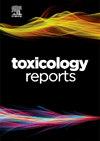L-arginine supplement ameliorates dichlorvos-induced systemic inflammatory response and liver dysfunction in male wistar rats
Q1 Environmental Science
引用次数: 0
Abstract
Dichlorvos (DDVP), a frequently used organophosphate insecticide, has been shown to cause systemic inflammation and liver damage via oxidative stress and inflammatory pathways. L-arginine, a semi-essential amino acid, has been shown to protect against oxidative damage and inflammation in a variety of animals. The study's main goal was to raise awareness of Dichlorvos's (DDVP) harmful effects on systemic inflammation and liver function, as well as L-arginine's possible mitigating impact. In order to assess the preventive benefits of L-arginine against induced liver dysfunction and systemic inflammation, liver tissue was selected for this investigation due to its vital role in detoxification and its high susceptibility to harm from toxic chemicals such as Dichlorvos. A total of 40 adult Wistar rats were separated into four groups: control, dichlorvos only, L-arginine only, and dichlorvos plus L-arginine. Dichlorvos was provided orally at a dose of 8 mg/kg body weight, whereas L-arginine was given orally at a dose of 100 mg/kg body weight for six weeks. The study investigated systemic inflammation markers (C-reactive protein, TNF-α, IL-6, and Caspase 3) as well as liver function markers (ALT, AST, ALP, albumin, total protein and gamma glutamyl). The findings revealed that dichlorvos significantly (p < 0.05) enhanced systemic inflammation and decreased (p < 0.05) liver function when compared to the control group. However, L-arginine supplementation greatly improved these effects by significantly (p < 0.05) lowering inflammatory indicators and restoring liver enzyme levels to normal. Histopathological findings validated L-arginine's protective function against dichlorvos-induced liver injury. These data indicate that L-arginine supplement may reduce the negative effects of dichlorvos on systemic inflammation and liver function, providing a possible therapeutic method for controlling organophosphate toxicity.
l -精氨酸补充剂改善敌敌畏诱导的全身炎症反应和雄性wistar大鼠肝功能障碍
敌敌畏(DDVP)是一种常用的有机磷杀虫剂,已被证明可通过氧化应激和炎症途径引起全身性炎症和肝脏损伤。精氨酸是一种半必需氨基酸,已被证明对多种动物的氧化损伤和炎症有保护作用。这项研究的主要目的是提高人们对敌敌畏(DDVP)对全身炎症和肝功能的有害影响的认识,以及l -精氨酸可能的缓解作用。为了评估l -精氨酸对诱导性肝功能障碍和全身性炎症的预防作用,研究人员选择肝脏组织作为研究对象,因为肝脏组织在解毒中起着至关重要的作用,并且极易受到敌敌畏等有毒化学物质的伤害。将40只成年Wistar大鼠分为对照组、单用敌敌畏组、单用l -精氨酸组和敌敌畏加l -精氨酸组。敌敌畏口服剂量为8 mg/kg体重,l -精氨酸口服剂量为100 mg/kg体重,持续6周。该研究调查了全身炎症标志物(c反应蛋白、TNF-α、IL-6和Caspase 3)以及肝功能标志物(ALT、AST、ALP、白蛋白、总蛋白和γ谷氨酰基)。结果显示,与对照组相比,敌敌畏显著(p <; 0.05)增强了全身炎症,降低了肝功能(p <; 0.05)。然而,补充l -精氨酸可以显著改善这些效果(p <; 0.05),降低炎症指标,使肝酶水平恢复正常。组织病理学结果证实了l -精氨酸对敌敌畏所致肝损伤的保护作用。这些数据表明,补充l -精氨酸可以减少敌敌畏对全身炎症和肝功能的负面影响,为控制有机磷毒性提供了一种可能的治疗方法。
本文章由计算机程序翻译,如有差异,请以英文原文为准。
求助全文
约1分钟内获得全文
求助全文
来源期刊

Toxicology Reports
Environmental Science-Health, Toxicology and Mutagenesis
CiteScore
7.60
自引率
0.00%
发文量
228
审稿时长
11 weeks
 求助内容:
求助内容: 应助结果提醒方式:
应助结果提醒方式:


